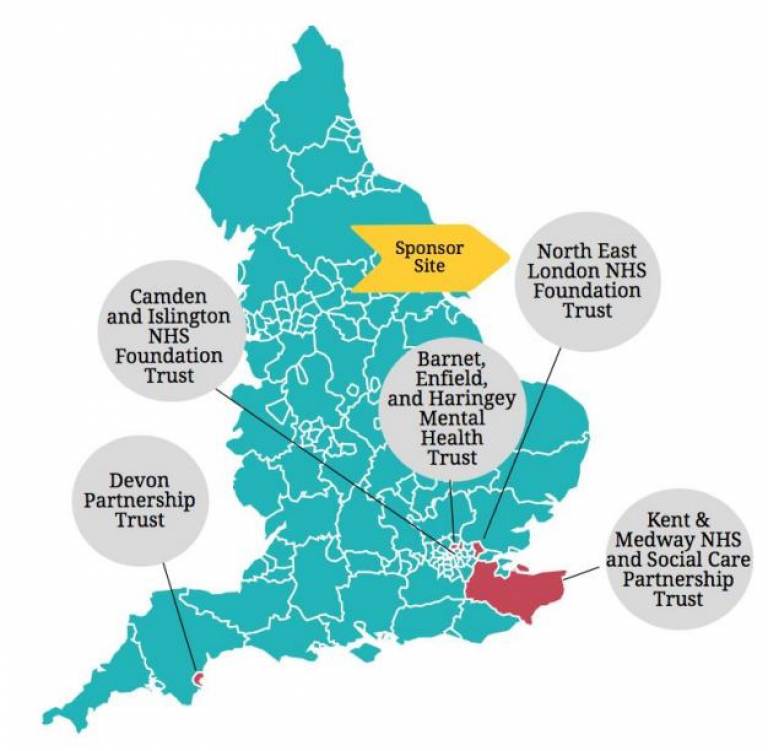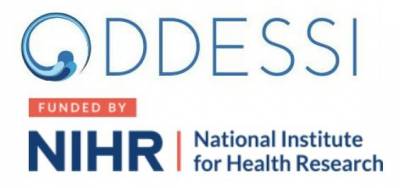ODDESSI
ODDESSI (Open Dialogue: Development and Evaluation of a Social Network Intervention for Severe Mental Illness) is a large-scale programme of research into crisis and continuing mental health care within the NHS. This programme is directed by Professor Stephen Pilling (UCL), funded by the National Institute of Health Research (NIHR) and managed by North East London NHS Foundation Trust (NELFT) and includes Open Dialogue and research teams in five NHS Trust research sites:

Aims
ODDESSI aims to transform the current model of health care for patients with major mental health problems. The research asks several questions:
- Can we develop a way to offer Open Dialogue in the NHS that is acceptable to staff (including peers) and service-users? Does it fit in with how existing NHS services operate?
- Does offering Open Dialogue result in good clinical outcomes, and is it worth the money?
- What is the experience of service users, carers, and staff?
Within the programme there are smaller projects focusing on:
- How NHS mental health services are configured, and how they change
- Mental health services and referral pathways in different Trusts
- Peers and their role within Open Dialogue teams
- Training people to deliver Open Dialogue
- Whether it would be possible to compare Open Dialogue to treatment-as-usual in a large multi-centre trial (the feasibility trial)
- The health economics of Open Dialogue and of treatment-as-usual
Comparing Open Dialogue with NHS usual care: The trial
The ODDESSI trial is working with participants receiving Open Dialogue or usual care to look at which approach is most helpful. We are also looking at whether a sense of shared decision making is important in recovery, and a person’s relationships, and what the experiences of carers and staff have been. The first participant was recruited in June 2019, and the final participants in August 2021. We follow up participants for two years with research interviews and by collecting information from their electronic records.
Here Professor Stephen Pilling and Dr Russell Razzaque present an overview of the ODDESSI research programme and trial protocol.
Capturing the experiences of carers in the trial
As part of the trial, we aim to recruit a 20% subsample of carers, friends, family or individuals supporting the trial participants. The ODDESSI research team in Devon spoke with some of the carers that had been recruited about their experiences on the ODDESSI trial. Some of the quotes can be seen below.
“The research questions are cathartic.It’s a reflective space… I would’ve never have thought about in my role as a carer, it’s a reflective time for myself…we are fortunate to have this space, it is our space.I always enjoy our chats, it keeps me going…It’s part of our wellbeing by giving our experiences to others- the trial was perfect for this.I wanted to do anything I could to support them… if this helps you to assess open dialogue, … long term it’ll help lots of other people.
Response to COVID-19
In response to the COVID-19 pandemic, we made some changes to the conduct of the ODDESSI trial. Recruitment of new participants was temporarily suspended from March 2020 for up to 6 months. Research activities such as interviews with participants were over the phone or via video rather than being in person. Despite this move, the rate of follow-up assessments have remained high.
Open Dialogue and usual NHS care was also in many cases delivered remotely, and this work was supported by a trial specific Remote Working Guidance document. To access this document or find out more information, please visit our Patient and Public Involvement page.
The Process Evaluation
A concurrent Process Evaluation looks to provide some context to the results of the main trial and the implications for health services. It is led by Professor Tim Weaver at Middlesex University, Professor Jerry Tew and Dr Sarah Carr at the University of Birmingham, and Corrine Hendy at the University of Nottingham.
It examines data from electronic records systems and by conducting interviews with service users, members of their social networks, peer practitioners, and clinical staff. Key questions are:
- What are crisis teams, community mental health teams, and Open Dialogue teams that are part of the trial doing on a day-to-day basis?
- What are their team structures, staffing levels, and staff retention?
- Are people's caseloads comparable?
- How is care being delivered across the teams, and what are the differences and similarities?
- What is it like to deliver all treatments within these teams, and what is it like to be a client of one of these teams?
Work by the Process Evaluation team has gone into capturing the experiences of staff and clients during the COVID-19 pandemic, to ensure that the delivery of the trial interventions were not negatively impacted by the move to online working and that the trial could continue.
 Close
Close



